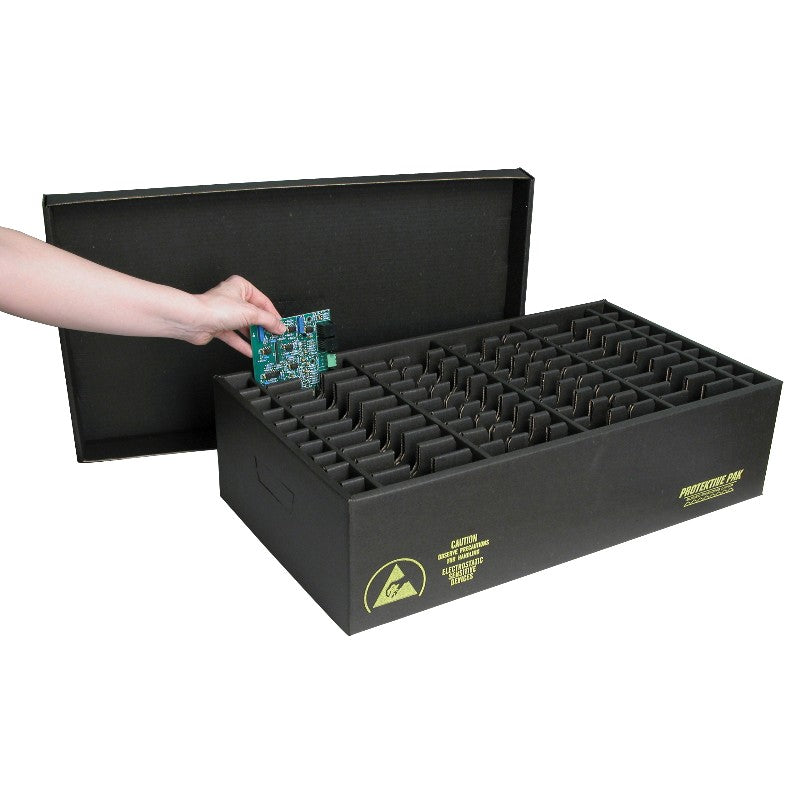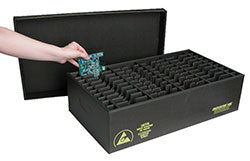PROTEKTIVE PAK
PROTEKTIVE PAK 37250 INPLANT HANDLER, CELL SIZE 8-3/4 x 7-1/8 x 1 IN
PROTEKTIVE PAK 37250 INPLANT HANDLER, CELL SIZE 8-3/4 x 7-1/8 x 1 IN
SKU:PPK-37250
Couldn't load pickup availability
Box Inner Dimensions (L x W x D): 17" x 13" x 8-3/4" (Box #37512)
Cell Inner Dimensions (L x W x T): 8-3/4" x 7-1/8" x 1"
Number of Cells: 20
- Shields ESD sensitive items from charges and electrostatic discharges (with lid in place)
- Shipping, handling, and storage container
- Constructed of impregnated corrugated material for greater durability
- Static dissipative surface resistivity of 106 - 108 ohms
- Buried shielding layer minimizes the potential of sloughing and rub-off contamination
- Easy assembly without the need for tape, glue, or staples
- Made from 100% recycled material and is 100% recyclable
- Lid Included to shield ESD sensitive contents
- Made in the United States of America
This In-Plant Handler addresses the following concerns:
Transportation of sensitive products outside of an EPA shall require packaging that provides:
1. Low charge generation.
2. Dissipative or conductive materials for intimate contact.
3. A structure that provides electrostatic discharge shielding.
(ANSI/ESD S541 section 6.2 Outside an EPA)
"Packaging materials that are in intimate contact with devices should be dissipative." ANSI/ESD S541 section 7.2.2 Resistance of Dissipative Materials
ESD Handbook TR 20.20 paragraph 5.4.3.3.1 Returnable and Reusable Packaging, "In some situations, packaging may be designed for reuse [and] may be reused numerous times. Examples of these types of ESD protective packaging are hinged containers, boxes, and other rigid or semi -rigid containers. The initial cost of these packages may be relatively expensive. However, if the appropriate collection and recycling system is used, the container may be the least expensive choice over time."
ESD protective packaging shall be marked with the ESD Protective Symbol." "Packaging should be marked with information that allows traceability to the packaging manufacturer and to the manufacturer's date/lot code information. The date/lot code should allow traceability to quality control information pertaining to the manufacture of the specific lot of packaging." (ANSI/ESD S541 section 8.2.1 Material Identification and section 8.2.3 Traceability)

This product is constucted from Protektive Pak Impregnated Corrugated Material.
- Static dissipative surface of 106 - 108 ohms tested per ANSI/ESD 11.11 - minimizing the potential of rapid discharge or sparking
- Buried shielding layer protects ESDS items, minimizing the potential of sloughing and rub-off contamination
- Made from 100% recycled material, and is 100% recyclable
- No tooling costs
- Reusable, ensuring best value
Superiority of Protektive Pak
Impregnated Corrugated vs. Coated Material
| Impregnated | Coated Material |
| CONSISTENT QUALITY Manufactured by one paper mill with computerized control, resulting in consistent high quality. | Manufactured without computer controls and applied at various geographical locations, resulting in quality variations. |
| STATE-OF-THE-ART TECHNOLOGY Carbon is added during the paper making process. The paper is a 6 layer process. The top surface layer is static dissipative, measuring 106 to 108 ohms. The conductive layer is in the 5th layer from the surface measuring <104 ohms. | Material is coated or printed with carbon loaded black ink which is then coated with a clear sealer to help coating stay on. Shielding layer is very close to surface and high carbon content can bleed through. Result is poor and inconsistent static dissipative effectiveness. |
| LOWER SULFUR CONTENT Manufactured from 100% recycled paper with consistently low sulfur content. | Manufactured from either recycled or virgin paper or a combination of both. Sulfur content may be low or high which can cause corrosion to leads and circuits. |
| GREATER DURABILITY 1,000 Times Thicker. Abrasion tests have shown no loss in particles at 100 cycles, only 1% loss for 200 cycles and 60% loss for 500 cycles. | Tests have shown a 50% loss in particles in only 10 cycles and a 100% loss in 100 cycles. |
| SLOWS RAPID DISCHARGE Burying the conductive layer under a dissipative surface reduces the potential for a rapid discharge when contacted by a charged device. | A very conductive surface that may pose a charged device model (CDM) ESD danger to components stored in open bin boxes, in-plant handlers, shippers, totes, nesting trays, etc. |
| BETTER SHIELDING EFFECTIVENESS Shielding effectiveness is equal to or greater than coated conductive materials. | Some coated products shield poorly due to inconsistent application procedures by some manufacturers. |
| BETTER VALUE More durable structure, 1,000 times thicker, which consistently shields your product from ESD, is also safer and better for the environment. | Simple structure which can lack consistency of ESD shielding, durability, and safety. |
 |
 
|
|
|
NOTE: All three microscopic photos are approximately the same scale. | ||
Protektive Pak impregnated corrugated fiberboard with static dissipative surface and buried shielding layer have consitently proved superior to coated or printed materials. The ESD protection layers simply do not wear off in abrasion tests like coated materials.
| Properties | Typical Values | Test Procedures/ Method |
| Surface Resistivity | Meets ANSI/ESD S20.20 and Packaging standard ANSI/ESD S541 1 x 106 to < 1 x 109 ohms | ANSI/ESD STM11.11 |
| Corrosivity | Contains 1-3 ppm reducible sulfur | FED-STD-101, Method 3005 for reducible sulfur |
| Sloughing Test | Negligible surface damage at 10 cycles and <5% of surface damage at 200 cycles in Taber Abradion Test. | ASTM D4060 at 70 rpm with CS-17 abrasive-coated wheels and 1000 grams load |
| No conductive particles abraded from surface | Rockwell International Test Report of January 8, 1992 | |
| Recyclability | Complete recyclability of package | Rockwell International Test Report of January 8, 1992 |
| Biodegradability | Biodegradation in or on moist soil |




